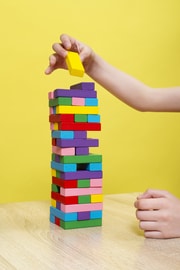8 of the Best Brain Games for Children
Looking for ways to engage kids that don’t involve a TV of some kind? Want to entertain your child in a way that is helpful to their growth and development? Challenging games for kids are simpler than you think. Children are growing constantly, and their brains are making new connections all the time.
These easy brain games can be done almost anywhere and will help your child develop important thought processes for later in life.
So, let’s have a look at the list and see what’s hot these days!
1. Minesweeper
Minesweeper is a single-player puzzle video game where players clear a rectangular board by revealing cells without hitting hidden mines, using numeric clues to avoid detonation.
It’s excellent for children as it helps develop critical thinking, problem-solving skills, and logical reasoning while providing a challenging and engaging gaming experience.
2. I Spy and Simon Says
These games for children can be more productive than you may realize. Saying “I spy with my little eye something green” and then having your child find the green objects in the room helps with spatial awareness, memory, and language.
Simon Says offers a lot of the same benefits, as well as enhancing attention and a better ability to follow instructions.
3. A Scavenger Hunt
You might not think that a scavenger hunt involves brain training, but by making it a themed scavenger hunt, you can teach them about all kinds of topics. This also helps them with focus and orienting tasks in a certain order of completion. It can be a great game when you need them entertained for a while as well.
4. Building Blocks
Providing your child with blocks or other toys that can be stacked and built upon may seem like a very simple way of keeping a child busy. However, this can help early development of color recognition, coordination, and math skills.
This can be helpful later when your child needs to tackle some easy school projects, and they already have the basic building blocks of construction and crafts.
5. Playing Pretend
While playing pretend may feel like a child’s play, it is filled with brain exercises. Playing pretend or make-believe helps your child with language, emotional skills, social skills, and learning to think on the spot.
They will better understand things in the world and how it works. Try being creative with playing pretend by doing a wide variety of roles.
6. Story Time
This is not just about reading to your child from a book, but giving them the opportunity to tell their own story. Allowing your child to create their own narrative helps with memory, building up language abilities, and confidence in your child’s own imagination.
You can use prompts to get started and take turns making up stories together. This is a great activity for car rides when there isn’t much going on.
7. Puzzles
Puzzles are great for brain training, and you can find puzzles that fit a variety of ages. Whether you’re doing Sudoku, a word puzzle, or an actual puzzle with pieces, your child is learning spatial awareness, fine motor skills, problem-solving and more.
There are also online puzzles for kids who are more interested in playing games online.
8. Game Night
Board games and card games make for great brain exercises. You can do a family game night with everyone, or simply play games when you have the time. Games can help a child learn how to handle frustration, how to plan and coordinate, and problem solve on the spot.
Best Brain Games
Some of the best brain games are simple and easy to learn, but can help your child in innumerable ways. You don’t need lots of fancy gadgets and tech to help your child learn how to succeed in the world.
Often the best games are the ones where you’re having fun and don’t even realize you’re learning. And if this helped you get some good ideas on how to entertain and teach your child at the same time, keep reading for more great tips and tricks.





